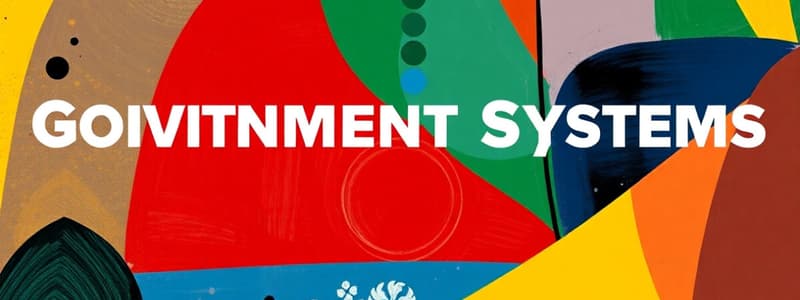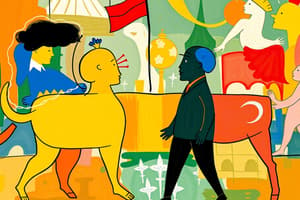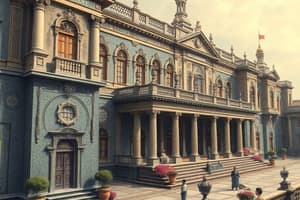Podcast
Questions and Answers
What is the primary focus of realism in political science?
What is the primary focus of realism in political science?
- Class relations and economic factors
- Cooperation among states
- Conflict and competition in international relations (correct)
- Social constructs in politics
Sovereignty means a state can govern itself without any outside interference.
Sovereignty means a state can govern itself without any outside interference.
True (A)
Name one field of study within political science.
Name one field of study within political science.
Comparative politics
In a __________ system, the government is elected by the people.
In a __________ system, the government is elected by the people.
Match the political systems with their characteristics:
Match the political systems with their characteristics:
What role do interest groups play in political behavior?
What role do interest groups play in political behavior?
Authoritarianism allows for multiple parties to compete in elections freely.
Authoritarianism allows for multiple parties to compete in elections freely.
What is the definition of authority in political science?
What is the definition of authority in political science?
According to political institutions, the __________ is responsible for making laws.
According to political institutions, the __________ is responsible for making laws.
What does globalization refer to in international relations?
What does globalization refer to in international relations?
Flashcards are hidden until you start studying
Study Notes
Overview of Political Science
- Definition: Political science is the study of politics, government systems, and political behavior.
- Fields of Study: Includes comparative politics, international relations, political theory, public administration, and public policy.
Key Concepts
- Power: The ability to influence or control the behavior of people or institutions.
- Authority: Legitimate power recognized and accepted by the society.
- State: A political entity with a defined territory, a permanent population, and a government.
- Sovereignty: The authority of a state to govern itself without external interference.
Theories of Political Science
- Realism: Focuses on the competitive and conflictual side of international relations.
- Liberalism: Emphasizes cooperation and the potential for peaceful coexistence among states.
- Constructivism: Highlights the role of social constructs and identities in shaping international relations.
- Marxism: Analyzes the impact of economic factors and class relations in politics.
Political Systems
- Democracy: A system where government is elected by the people, characterized by free and fair elections.
- Authoritarianism: A system where power is concentrated in a leader or a small group, with limited political freedoms.
- Totalitarianism: An extreme form of authoritarianism that seeks to control all aspects of public and private life.
Political Institutions
- Legislature: The body responsible for making laws (e.g., Congress, Parliament).
- Executive: The branch that enforces laws (e.g., President, Prime Minister).
- Judiciary: The system of courts that interprets and applies the law.
Political Behavior
- Voting: The process by which citizens select their representatives.
- Political Parties: Organized groups that seek to gain power by winning elections.
- Interest Groups: Organizations that advocate for specific policies or interests.
International Relations
- Globalization: The increasing interconnectedness of countries through trade, communication, and culture.
- International Organizations: Entities such as the United Nations (UN) that promote cooperation among states.
- Geopolitics: The study of how geographical factors influence politics and international relations.
Public Policy
- Policy Analysis: The evaluation of existing policies to assess their effectiveness.
- Public Administration: The implementation of government policy and the management of public programs.
Current Trends
- Populism: A political approach that seeks to represent the interests of ordinary people, often in opposition to the elite.
- Climate Politics: The study of how political actors address environmental issues and climate change.
- Digital Governance: The impact of technology and social media on political processes and public engagement.
Overview of Political Science
- Political science investigates politics, government structures, and behavior.
- Major branches include comparative politics, international relations, political theory, public administration, and public policy.
Key Concepts
- Power: The capacity to influence or control individuals and institutions.
- Authority: Recognized legitimate power accepted by society.
- State: Defined territory with a permanent population and governance.
- Sovereignty: The right of a state to self-govern without outside interference.
Theories of Political Science
- Realism: Examines competition and conflict within international relations.
- Liberalism: Stresses the significance of cooperation and peaceful coexistence among nations.
- Constructivism: Focuses on how social constructs and identities shape international interactions.
- Marxism: Investigates the influence of economic and class dynamics in political arenas.
Political Systems
- Democracy: Government derives from the consent of the governed through free and fair elections.
- Authoritarianism: Concentration of power in a single leader or small group, limiting political freedoms.
- Totalitarianism: An extreme authoritarian regime aiming to control all societal aspects.
Political Institutions
- Legislature: Law-making body (e.g., Congress or Parliament).
- Executive: Enforces laws (e.g., President or Prime Minister).
- Judiciary: Courts that interpret and apply legal statutes.
Political Behavior
- Voting: Citizens’ selection of representatives occurs through elections.
- Political Parties: Groups organized to win elections and gain governmental power.
- Interest Groups: Entities that lobby for specific policies or advocate on particular issues.
International Relations
- Globalization: Enhanced interconnections among nations via trade, communication, and cultural exchange.
- International Organizations: Groups like the UN foster international cooperation and conflict resolution.
- Geopolitics: Examines the influence of geographical factors on domestic and foreign policies.
Public Policy
- Policy Analysis: Evaluates existing policies to measure effectiveness and impact.
- Public Administration: Focuses on executing governmental policies and managing public programs.
Current Trends
- Populism: Political movements that claim to champion the average citizen against elite interests.
- Climate Politics: Analysis of how political figures tackle climate change and environmental challenges.
- Digital Governance: Explores how technological advancements and social media reshape political engagement and decision-making processes.
Studying That Suits You
Use AI to generate personalized quizzes and flashcards to suit your learning preferences.




